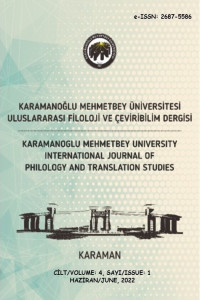Öz
Azar Nafisi’s Read Dangerously: The Subversive Power of Literature in Troubled Times is an inspiring book that brings readers out of their “comfort zone” where they read “texts that confirm [their] presuppositions and prejudices” (5). Nafisi complains that most readers avoid reading dangerously in order not to break their “comfort zone”. This, however, causes atrophy to their senses and makes them passive and indifferent to the problems of today’s world. To Nafisi, such readers don’t believe that “sky is falling till a chunk of it falls on [them]” (92). Ordinariness is what such readers suffer from. Nafisi further claims that ordinariness is the most fearsome state since ordinary people even normalize the violent deeds of totalitarian regimes. They take them for granted without questioning or raising doubts about them. They become docile bodies in the society easily conditioned to move into the predetermined spaces created by the authorities. Realizing the potential threat of routine to individual liberty in the growing totalitarianism, Nafisi urgently suggests the necessity of reading dangerously that would raise higher consciousness in readers in order to actively engage with the opposition. Through reading dangerously, she believes that readers can be carried away to a “disaster zone” which enables readers to negotiate over some critical concepts such as enemy, oppressor, and victim.
Anahtar Kelimeler
Teşekkür
İlginiz ve alakanız için şimdiden teşekkür ediyorum.
Kaynakça
- Nafisi, Azar (2022). Read Dangerously: The Subversive Power of Literature in Troubled Times. Dey Street Books. Newyork. 240 pages.
Öz
Azar Nafisi’s Read Dangerously: The Subversive Power of Literature in Troubled Times is an inspiring book that brings readers out of their “comfort zone” where they read “texts that confirm [their] presuppositions and prejudices” (5). Nafisi complains that most readers avoid reading dangerously in order not to break their “comfort zone”. This, however, causes atrophy to their senses and makes them passive and indifferent to the problems of today’s world. To Nafisi, such readers don’t believe that “sky is falling till a chunk of it falls on [them]” (92). Ordinariness is what such readers suffer from. Nafisi further claims that ordinariness is the most fearsome state since ordinary people even normalize the violent deeds of totalitarian regimes. They take them for granted without questioning or raising doubts about them. They become docile bodies in the society easily conditioned to move into the predetermined spaces created by the authorities. Realizing the potential threat of routine to individual liberty in the growing totalitarianism, Nafisi urgently suggests the necessity of reading dangerously that would raise higher consciousness in readers in order to actively engage with the opposition. Through reading dangerously, she believes that readers can be carried away to a “disaster zone” which enables readers to negotiate over some critical concepts such as enemy, oppressor, and victim.
Anahtar Kelimeler
Kaynakça
- Nafisi, Azar (2022). Read Dangerously: The Subversive Power of Literature in Troubled Times. Dey Street Books. Newyork. 240 pages.
Ayrıntılar
| Birincil Dil | İngilizce |
|---|---|
| Konular | Sanat ve Edebiyat |
| Bölüm | Kitap İncelemesi |
| Yazarlar | |
| Yayımlanma Tarihi | 29 Haziran 2022 |
| Gönderilme Tarihi | 26 Nisan 2022 |
| Kabul Tarihi | 21 Haziran 2022 |
| Yayımlandığı Sayı | Yıl 2022 Cilt: 4 Sayı: 1 |
422x119
Articles published in this journal are licensed under Creative Commons Attribution 4.0 International license. This journal does not charge APCs or submission charges. Articles published in this journal are permanently free for everyone to read, download, copy, distribute, print, search and link to the full texts of these articles. |












